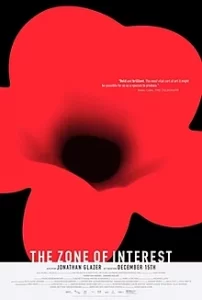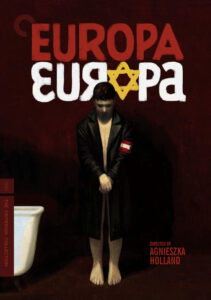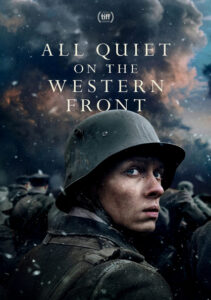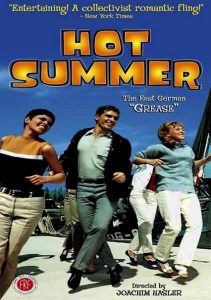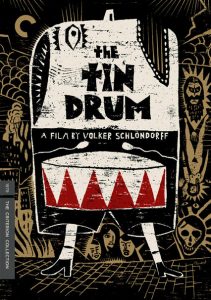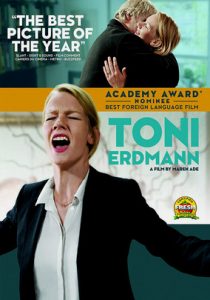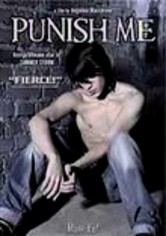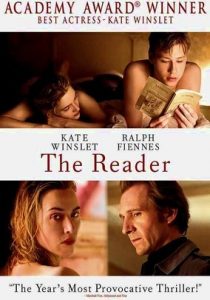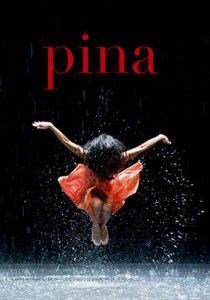The Zone of Interest-2023
Director Jonathan Glazer
Starring Christian Friedel, Sandra Hüller
Scott’s Review #1,419
Reviewed February 2, 2024
Grade: A
The Zone of Interest (2023) offers a unique experience for its audience. It’s one of a distant observer to unthinkable horrors and events that took place during the 1940s occupied Poland.
A lovely estate rife with flourishing flowers and plush gardens surrounds the haunting setting of the Auschwitz concentration camp.
Exterminations and unspeakable acts of human suffering occur daily whilst a German family enjoys their dream home hardly unnerved by what’s going on steps away.
The father is the mastermind behind the suffering.
The macabre film is extraordinary, and powerful, and will haunt you long after it ends.
The subject matter of the Holocaust in cinema is usually told with a visual examination of the victims. In The Zone of Interest, though, what you don’t see is worse than what you do.
The commandant of Auschwitz, Rudolf Höss (Christian Friedel), and his wife Hedwig (Sandra Hüller) live a seemingly idyllic life with their five children. They fish, swim, and frolic among the confines of their house and garden next to the camp.
Höss is a high-ranking and respected member of the Third Reich. Servants handle chores around the house, while the prisoners’ belongings are given to the family.
As a viewer, I first thought to myself what a happy family they seem to be. I was quickly sickened when I realized what was going on over the top of their high walls and their role in it.
Director, Jonathan Glazer, brought us disturbing films such as Birth (2004) and Under the Skin (2015) and revolts even more with The Zone of Interest. I’m not sure I’ve ever seen a film quite like it.
Usually, what happens in a film happens on screen. Seeing the Jews gassed or shot or tortured is horrific enough. Spielberg’s Schindler’s List (1993) was a masterpiece by visually featuring the nature of the Holocaust in an inventive black-and-white way.
We see the victims.
In The Zone of Interest, it’s the sound that is effective. Beyond the garden wall, gunshots, shouting, and sounds of trains and furnaces are constantly heard.
The nights are even worse.
A quick glimpse of flames and smoke roaring to the sky are the visuals key to the events taking place next door.
We only very quickly see a parade of prisoners march through the grass……once.
Höss approves the design of a new crematorium, which soon becomes operational. With horror, it is confirmed that thousands of Jews are gassed and burned.
Glazer keeps the viewer at a distance with more than just experiencing the unseen. The cameras are set far back from events so the audience observes the family instead of being alongside.
There are no closeups.
The lighting is superior. Muted tones portray the starkness of the period. Effective is how everything appears grey except the flowers in the garden.
Some peculiarities exist that are hard to figure out. In two sequences, a Polish girl who lives nearby sneaks out every night, hiding food at the prisoners’ work sites for them to find and eat.
The film is a clay animation style similar to what Glazer used in parts of Under the Skin. It’s weird, stylistic, and fascinating.
Late in the film, Höss descends a staircase and retches. He does so again. I’m not sure why he does. Is he subconsciously sickened by the death he causes? He has been tasked with a new initiative to transport hundreds of thousands of Hungarian Jews to Auschwitz to be killed.
The mission has been named after him.
Is it too much for him to deal with?
The film ends with a modern scene of a group of janitors cleaning the Auschwitz-Birkenau State Museum before it opens.
I was dying to know what happened to Höss and Hedwig.
It’s a searing film, unforgettable and uncomfortable. It plods and sickens but is pure art. It’s troublesome and a unique entry for Holocaust films. Glazer finds a new way to examine material told in cinema for decades.
The Zone of Interest (2023) is a painful masterpiece and a thinking man’s film.
Oscar Nominations: 2 wins-Best Picture, Best Director-Jonathan Glazer, Best Adapted Screenplay, Best International Feature Film (won), Best Sound (won)
Independent Spirit Award Nominations: Best International Film
